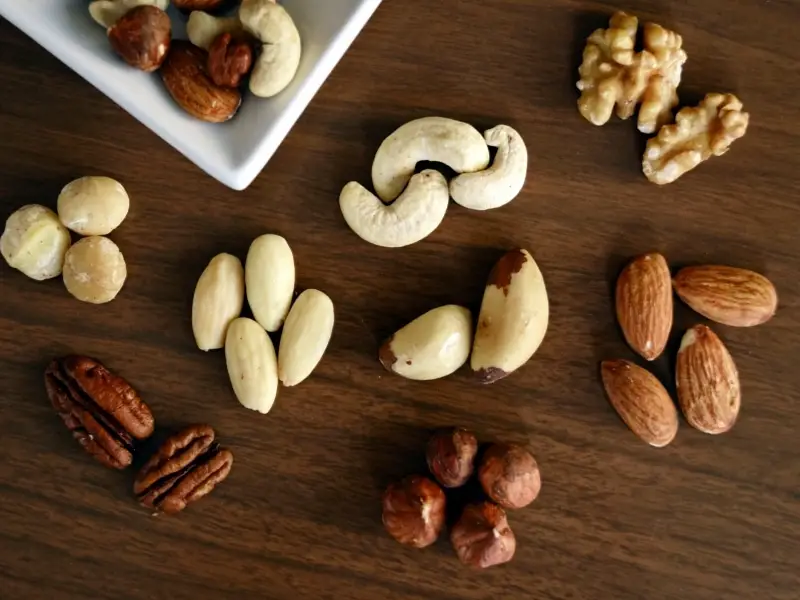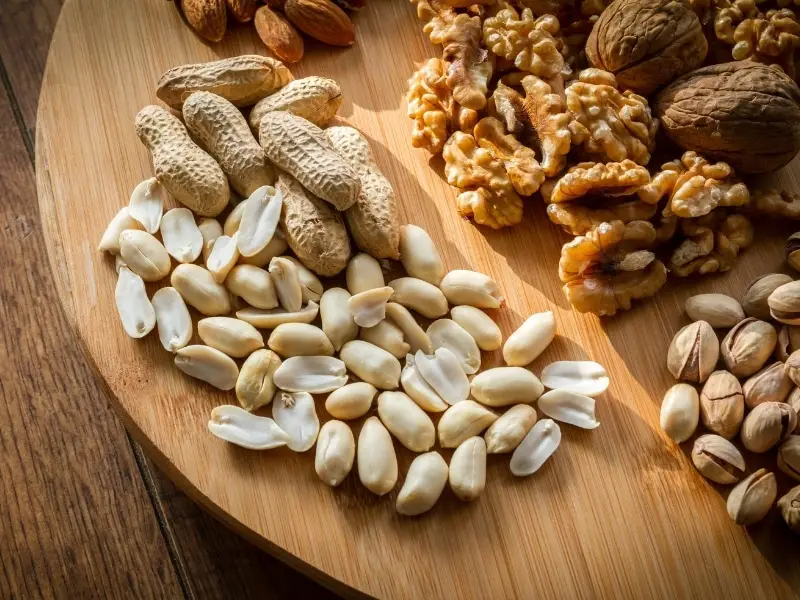Perfectly sized, nutritious, and delicious nuts might seem like an ideal snack to share with your pooch. While it’s not a secret that most dogs go nuts for nuts, the question is, are nuts safe for dogs to eat?
So, can dogs eat nuts? Some nuts are safe for dogs to eat in small amounts, but others pose a choking hazard and are hard to digest. While all nuts are high in fat, peanuts, cashews, pistachios, and chestnuts aren’t toxic to dogs. But, macadamia nuts, almonds, black walnuts, and brazil nuts are dangerous for dogs to eat.
In this article, we’ll tell you everything you need to know about feeding your dog nuts! Keep on reading to learn which types of nuts are safe and which nuts you should avoid!
Are Nuts Good for Dogs?
Nuts are a great source of many beneficial nutrients, such as protein, fiber, vitamins, and minerals. However, while most nuts are safe for dogs to eat, there are many other healthier human foods that you can share with your dog.
First of all, nuts are full of calories and high in fat which can lead to weight gain and obesity in dogs when consumed regularly. Secondly, due to their high-fat content, nuts can lead to pancreatitis which is a potentially life-threatening condition if not treated in time.
Generally speaking, a few peanuts, pistachios, or cashews once in a while won’t do any harm to your pooch and can be a tasty treat. But, dogs shouldn’t eat nuts regularly nor should they be used as a substitute for a complete and balanced diet.
Types of Nuts Dogs Can Eat

While the long-term effects of nuts for dogs are still unknown, nuts are too calorie-dense and too fatty to be a part of your dog’s regular diet. However, most experts agree that feeding your dog a few nuts once in a while isn’t harmful to their overall health.
Listed below are types of nuts you can occasionally feed to your dog:
1. Peanuts
Although peanuts are safe for dogs to eat, they can’t be salted, caramelized, coated, or candied. Also, dogs can’t eat peanuts in shells, but a few unsalted raw, or dry roasted peanuts can make a delicious treat.
While peanut butter isn’t technically a nut, it’s worth mentioning that dogs can have a spoonful of this creamy goodness as an occasional treat. But before you let your pooch gorge on peanut butter, check the label to see if there are no harmful ingredients, like xylitol which is toxic to dogs (source).
2. Pistachios
Pistachios are safe for dogs to eat, but only a few at a time as a super special treat. Besides being loaded in fat and calories, these tasty nuts also pose choking hazards to dogs, especially when not shelled.
Although pistachios aren’t toxic to dogs they can carry Aspergillus mold, which produces aflatoxin that can damage your dog’s liver. If you decide to feed pistachios to your pooch, make sure that they are fresh and shelled.
3. Cashews
Dogs can eat a few plain, unsalted cashews once in a while as delicious treats. Make sure that cashews are baked or roasted since raw cashews contain a dangerous toxin that can be harmful to your pooch.
4. Chestnuts
Plain boiled or roasted chestnuts are safe for dogs to eat in small amounts. Chestnuts are an excellent source of vitamins C, B1, and B2 and also contain essential minerals, including iron, potassium, and copper.
These tasty nuts are also loaded in fiber that can be extremely helpful if your pooch is suffering from constipation or diarrhea.
Types of Nuts Dogs Can’t Eat

Truth be told, all nuts can be dangerous for dogs when consumed in large amounts or fed regularly. While some of the nuts listed below aren’t toxic to dogs, the risks of eating them are far greater than any potential benefits.
If you like to eat nuts, here are several types you should keep out of reach and avoid feeding to your dog.
1. Almonds
While almonds aren’t toxic to dogs, they are difficult to digest, pose a choking hazard, and are high in fat which can lead to pancreatitis. Furthermore, almonds are often sold salted, seasoned, or covered in chocolate or sugar which makes them dangerous for dogs to eat.
2. Walnuts
Dogs shouldn’t eat walnuts, since they are difficult to chew, pose a choking hazard, and can lead to intestinal blockage. Furthermore, walnuts can be toxic to dogs since they are often moldy and contain fungi that produce tremorgenic mycotoxins which causes neurological problems in dogs.
Please note, moldy black walnuts can be particularly dangerous for dogs since the mold is a powerful fungal neurotoxin that can cause weakness, seizures, and even death (source). If your dog shows any signs of black walnut poisoning, call your vet immediately!
3. Hazelnuts
Although hazelnuts aren’t toxic to dogs, you shouldn’t feed them to your pooch since they can cause intestinal obstruction and pose a choking hazard. Generally speaking, your pooch won’t have any problems if they ate a few plain, uncoated, roasted hazelnuts, but to be on the safe side, observe your pup for signs of digestive distress.
4. Macadamia Nuts
Macadamia nuts are extremely toxic to dogs, even when consumed in small amounts. Eating only one macadamia nut can be very dangerous and cause your dog to vomit, shiver, have seizures, fever, and diarrhea.
If you suspect that your dog ate macadamia nuts, or if they show any of these symptoms, call your vet or Pet Poison Helpline right away.
5. Brazil Nuts
While Brazil nuts aren’t toxic to dogs, they aren’t good for them either. As one of the fattiest types of nuts, Brazil nuts can upset your dog’s tummy and cause many digestive problems.
Feeding your pup Brazil nuts regularly can lead to pancreatitis and obesity, both of which are serious health problems.
6. Pecans
Pecans can be a tasty and nutritious snack for you, but you shouldn’t share them with your pooch. Like other nuts, pecans can become moldy and contain tremorgenic mycotoxins that can cause tremors, seizures, and damage your dog’s neurological system (source).
Moldy pecans can also contain aflatoxin, produced by Aspergillus fungi which can cause loss of appetite, sluggishness, jaundice, and liver damage in dogs.
How Many Nuts Can a Dog Eat?
Before you start feeding nuts to your dog, consult your vet to see whether or not your pooch might benefit from eating nuts. Your veterinarian will also tell you what types of nuts are safe for your dog and how much they should eat.
Generally speaking, you can feed a few nuts such as peanuts, cashews, or pistachios once in a while to your pooch as a special treat. Don’t forget, only feed plain and unsalted roasted nuts to your dog.
How to Feed Nuts to Your Dog?
If you decide to feed nuts to your dog, make sure that they are fresh, unseasoned, and shelled. Also, monitor your dog while they are eating nuts for signs of choking.
Ways you can feed nuts to your dog:
- Feed one nut a time as a tasty treat
- Mix a few nuts with your dog’s food
Conclusion
In light of these facts, your dog might be better off not eating nuts at all. While some types of nuts, such as peanuts, pistachios, chestnuts, and cashews are safe for dogs to eat, they are high in fat which can cause pancreatitis and weight gain in the long run.
Full of calories, nuts can easily become moldy, putting your dog at risk of fungal contamination and poisoning. If your dog manages to eat a large number of nuts, contact your vet immediately to avoid serious health complications.
Related Articles:


0 Comments